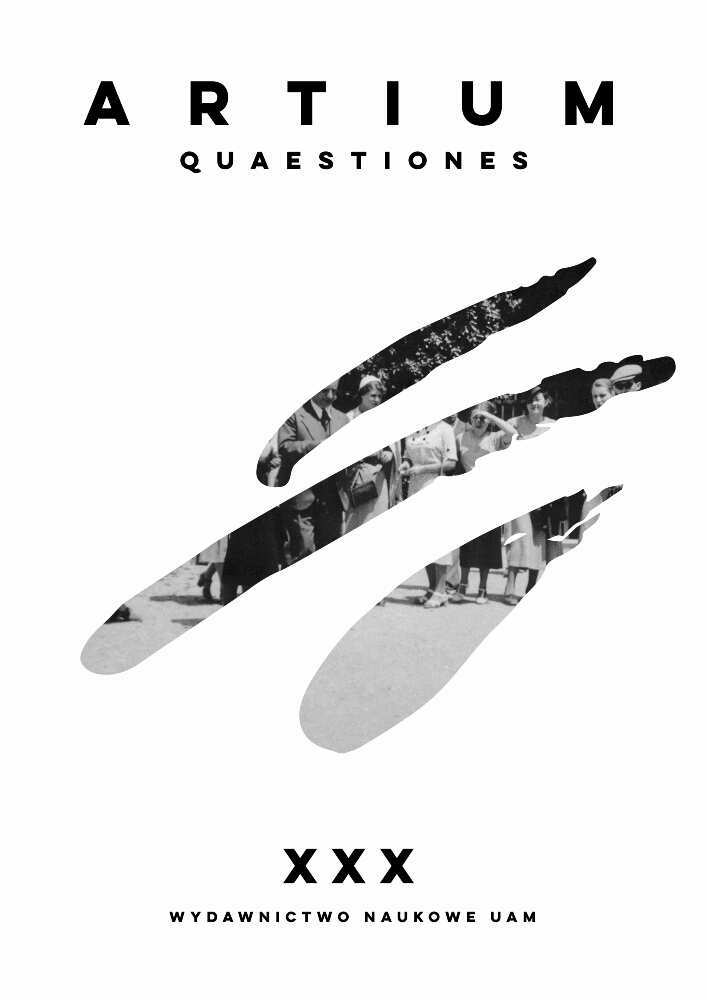Abstrakt
When Aristotle asked at what particular moment we can say that an army is fleeing, which is certainly not when individual soldiers start leaving the battlefield, he formulated a problem that is important also for today’s art history: are there any moments in the history of art that can be called turning points? In individual artistic careers, such points are related to crises, allowing the artist to overcome an impasse and find a way toward reaching a goal. Quite often, such a turn occurs suddenly, at some particular moment which ancient Greeks called the kairos. The changes in art approached en bloc also happen thanks to the background of values and some goal of artistic creation. A turning point may imply overcoming a crisis or a period of decline and decadence – always a state of affairs defined in negative terms. A separate case is definitely a political decree that triggers off a change, which implies violence committed on culture. Finally, in academic art history a turning point may be related not only with a crisis, but also with evolution. It’s perception is relative, but because of that the history of art can be rewritten.
Bibliografia
Agamben G., Czas, który zostaje. Komentarz do „Listu do Rzymian”, tłum. S. Królak, Warszawa 2009
Arystoteles, Analityki wtóre, tłum. K. Leśniak, Warszawa 1990 (= Arystoteles, Dzieła wszystkie, t. 1)
Aurenhammer H., Max Dvořák (1874–1921). Von der historischen Quellenkritik zur Kunstgeschichte als Geistesgeschichte, w: Österreichische Historiker. Lebensläufe und Karrieren 1900–1945, red. K. Hruza, Wien–Köln–Weimar 2012, t. 2, s. 169–200
Bakoš J., Die epistemologische Wende eines Kunsthistorikers, w: L’Art et les révolutions, Section 5: Révolution et évolution de l’Histoire de l’Art de Warburg à nos jours, red. H. Olbrich, Strasbourg 1992, s. 43–72
Bałus W., Max Dvořák ogląda Tintoretta, w: idem, Efekt widzialności. O swoistości widzenia obrazów, granicach ich odczytywania i antropologicznych aspektach sztuki, Kraków 2013, s. 25–49
Belting H., Das Ende der Kunstgeschichte. Eine Revision nach zehn Jahren, München 2005
Białostocki J., Kryzysy w sztuce, w: Kryzysy w sztuce. Materiały sesji Stowarzyszenia Historyków Sztuki, Lublin, grudzień 1985, Warszawa 1988, s. 9–24
Bielecki S., Kairos (1), w: Encyklopedia Katolicka, t. 8, Lublin 2000, szp. 334–337
Dvořák M., Das Rätsel der Kunst der Brüder van Eyck, München 1925
Dvořák M., El Greco i manieryzm, tłum. A. Porębska, w: Max Dvořák i jego teoria dziejów sztuki, oprac. L. Kalinowski, Warszawa 1974, s. 545–563
Dvořák M., Malarstwo katakumbowe. Początki sztuki chrześcijańskiej, tłum. E. Dwornik-Gutowska, A. Porębska, w: Max Dvořák i jego teoria dziejów sztuki, oprac. L. Kalinowski, Warszawa 1974, s. 5–42
Dvořák M., Foreword to „Oskar Kokoschka: Variations on a Theme” (1921), tłum. H. Mathews, w: The Expressionist Turn in Art History. A Critical Anthology, red. K.A. Smith, London–New York 2017, s. 231–234
Evers H.G., Historismus, w: Historismus und bildende Kunst, red. L. Grote, München 1965 (= Studien zur Kunst des 19. Jahrhunderts, t. 1), s. 25–42
Focillon H., Świat form, tłum. A. Olędzka-Frybesowa, w: Antologia współczesnej estetyki francuskiej, red. I. Wojnar, Warszawa 1980, s. 240–268
Hübsch H., In welchem Style sollen wir bauen?, Karlsruhe 1828
Juszczak W., Zasłona w rajskie ptaki albo O granicach „okresu powieści”, Warszawa 1981
Kalinowski L., Max Dvořák i jego metoda badań nad sztuką, Warszawa 1974
Kandyński W., O duchowości w sztuce, tłum. S. Fijałkowski, Łódź 1996
Karge H., Renaissance. Aufkommen und Entfaltung des Stilbegriffs in Deutschland im Zuge der Neorenaissance-Bewegung um 1840, w: Neorenaissance – Ansprüche an einen Stil. Zweites Historismus-Symposium Bad Muskau, Dresden 2001
(= Muskauer Schriften, t. 4, red. W. Krause, H. Laudel, W. Nerdinger), s. 39–66
Kosseleck R., Einige Fragen an die Begriffsgeschichte von „Krise”, w: Über die Krise. Castelgandolfo-Gespräche 1985, red. K. Michalski, Stuttgart 1986, s. 64–77
Kryzys, w: Nowa encyklopedia powszechna PWN, t. 3, Warszawa 1998, s. 586
Kubler G., Kształt czasu. Uwagi o historii rzeczy, tłum. J. Hołówka, Warszawa 1970
Kuderowicz Z., Biografia kultury. O poglądach Jakuba Burckhardta, Warszawa 1973
Łotman J., Kultura i eksplozja, tłum. B. Żyłko, Warszawa 1999
Przełom, w: Słownik języka polskiego, red. W. Doroszewski, <https://sjp.pwn.pl/doroszewski/przelom;5484156.html> [dostęp: 2 maja 2019]
Popper K.R., Nędza historycyzmu, Warszawa 1989
Porębski M., Ikonosfera, Warszawa 1972
Porębski M., Rytmy historii, w: idem, Interregnum. Studia z historii sztuki polskiej XIX i XX w., Warszawa 1975, s. 263–293
Rosenauer A., Das Rätsel der Kunst der Brüder van Eyck – Max Dvořák und seine Stellung zu Wickhoff und Riegl, w: Wien und die Entwicklung der kunsthistorischen Methode, red. S. Krenn, M. Pippal (= Akten des XXV. Internationalen Kongresses für Kunstgeschichte, Wien, 4.–10. September 1983, red. H. Fillitz, M. Pippal, t. 1), Wien–Köln–Graz 1984, s. 45–52
Sokorski W., Kryteria realizmu socjalistycznego, w: Czas debat. Antologia krytyki artystycznej z lat 1945–1954, t. 2: Realizm i formalizm, oprac. A. Pietrasik i P. Słodkowski, Warszawa 2016, s. 386–393
Vasari G., Żywoty najsławniejszych malarzy, rzeźbiarzy i architektów, tłum. K. Estreicher, t. 1, Warszawa–Kraków 1985
Vico G., La scienza nuova, Milano 1959
Vico G., Nauka nowa, tłum. J. Jakubowicz, Warszawa 1966
Woolf V., Do latarni morskiej, tłum. K. Klinger, Toruń 2016
Woolf V., Pani Dalloway, tłum. K. Tarnowska, Kraków 22016
Licencja
Prawo autorskie regulowane jest oświadczeniem autora przygotowanym przez Wydawnictwo Naukowe UAM a od nr XXVIII także umową licencyjną na publikację online zawartą pomiędzy Autorem i Uniwersytetem im. Adama Mickiewicza. Autorzy ponoszą odpowiedzialność za oryginalność zamieszczanego materiału tekstowego oraz regulację praw autorskich dotyczących materiałów ilustracyjnych. W przypadku, gdy materiały pochodzą od redakcji – odpowiedzialność ponosi redakcja czasopisma.
Ten utwór dostepny jest na licencji Creative Commons Uznanie autorstwa - Użycie niekomercyjne - Bez utworów zależnych 4.0 Międzynarodowe.
